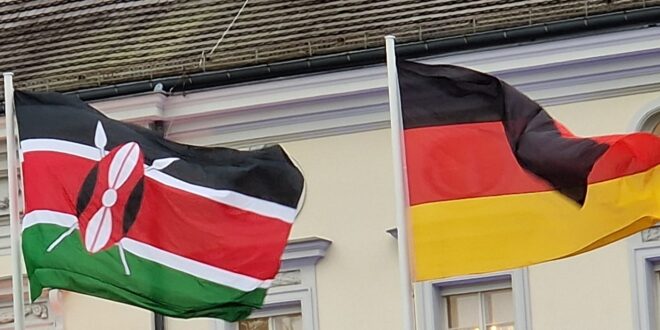Germany and Kenya have recently signed a migration and labour agreement aimed at addressing Germany’s need for skilled workers while discouraging irregular migration.
Signed in Berlin on 13 September 2024 by Germany’s Interior Minister Nancy Faeser and Kenya’s Cabinet Secretary for Foreign and Diaspora Affairs, Dr Musalia Mudavadi, and witnessed by German Chancellor Olaf Scholz and Kenyan President William Ruto, the Migration and Mobility Partnership Agreement seeks to promote regular migration while simplifying the repatriation of Kenyans who are obliged to leave Germany.
Key Points of the Agreement
- Access to the German Labour Market: The agreement facilitates Kenyan skilled workers’ entry into Germany, particularly for professions experiencing labour shortages. Qualified workers must meet professional standards and market requirements to be recruited.
- Legal Protection: Kenyan migrant workers are guaranteed legal protection and rights under German labour laws. This includes fair working conditions, social protection, and access to health and pension insurance.
- Alignment with Germany’s Skilled Immigration Act: The agreement mirrors key provisions of Germany’s new Skilled Immigration Act, which aims to attract qualified workers from abroad.
- Opportunities for Young Kenyans: The agreement will also enhance the immigration of young Kenyans for vocational training and study in Germany.
- Qualification Focus: One of the key areas is the qualification of potential workers, including promotion of professional and language skills (German language). Recognition programmes ensure that Kenyan workers are trained to meet German standards.
- Reintegration Support: Kenyan citizens returning home after working in Germany will be supported by return and reintegration programmes to ease their professional reintegration.
- Repatriation Simplification: The agreement simplifies the repatriation of Kenyans without legal residency in Germany. Kenya will use biometric data to identify its citizens, making it the first sub-Saharan African country to agree to such a measure.
- Expired Documents: Expired Kenyan passports and ID cards will be accepted as travel documents to enable repatriations, with Kenya extending the validity of its passport replacement documents.
- Bilateral Working Group: Germany and Kenya will set up a bilateral working group to ensure the successful implementation of the agreement.
Broader Impact
According to labour market experts, the Migration and Mobility Partnership Agreement opens up recruitment for Kenyan workers, especially in sectors where Germany faces critical shortages, such as IT, technical trades and healthcare.
Seen as a win-win deal, Kenya can send qualified workers to Germany, while Germany benefits from skilled labour to address its workforce gaps. Additionally, the agreement offers legal channels for labour migration, aiming to curb irregular migration.
Currently, around 14,800 Kenyan nationals live in Germany, with about 800 of them obliged to leave the country.
This deal is part of Germany’s broader strategy to address both labour shortages and irregular migration. The current coalition government established the office of the Special Representative for Migration Agreements to balance the dual objectives of increasing repatriation of foreigners obliged to leave while recruiting skilled workers from abroad.
Before Special Envoy Joachim Stamp took office in February 2023, Germany had negotiated a comprehensive migration agreement only with India. Since then, similar agreements have been signed with Georgia, Morocco, Colombia, Kenya and Uzbekistan, with ongoing talks involving Moldova, Kyrgyzstan, Ghana, and the Philippines, among others.
Femi Awoniyi
 THE AFRICAN COURIER. Reporting Africa and its Diaspora! The African Courier is an international magazine published in Germany to report on Africa and the Diaspora African experience. The first issue of the bimonthly magazine appeared on the newsstands on 15 February 1998. The African Courier is a communication forum for European-African political, economic and cultural exchanges, and a voice for Africa in Europe.
THE AFRICAN COURIER. Reporting Africa and its Diaspora! The African Courier is an international magazine published in Germany to report on Africa and the Diaspora African experience. The first issue of the bimonthly magazine appeared on the newsstands on 15 February 1998. The African Courier is a communication forum for European-African political, economic and cultural exchanges, and a voice for Africa in Europe.


































